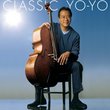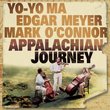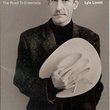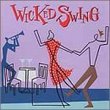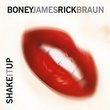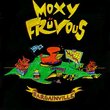| All Artists: Edgar Meyer Title: Meyer & Bottesini Concertos Members Wishing: 0 Total Copies: 0 Label: Sony Release Date: 6/11/2002 Genre: Classical Styles: Chamber Music, Historical Periods, Classical (c.1770-1830) Number of Discs: 1 SwapaCD Credits: 1 UPCs: 074646049020, 746460490202 |
Search - Edgar Meyer :: Meyer & Bottesini Concertos
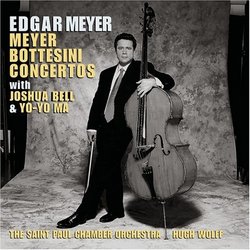 | Edgar Meyer Meyer & Bottesini Concertos Genre: Classical
On this record, featuring Edgar Meyer as both composer and bassist, the playing's the thing, and it is spectacular. His performance of four virtuoso concertos, two by himself and two by Bottesini, eclipses his compositions... more » |
Larger Image |
CD DetailsSynopsis
Amazon.com On this record, featuring Edgar Meyer as both composer and bassist, the playing's the thing, and it is spectacular. His performance of four virtuoso concertos, two by himself and two by Bottesini, eclipses his compositions, though his stylistic versatility is in full evidence in both his works. The Concerto for Bass has elements of jazz and blues, and a good deal of textural contrast and imaginative orchestration, but it is repetitive and a bit dreary. In the hair-raisingly difficult Bottesini Concerto, Meyer performs every imaginable and many unimaginable technical feats, covering a range of more than six octaves and producing sounds from growls to flutelike harmonics. Apparently craving even more pyrotechnics, he substitutes his own cadenzas for the composer's. Two equally stunning virtuosos join him for the other works. In his Double Concerto for Cello and Bass, he and Yo-Yo Ma chase each other up the fingerboard to the highest register, where, with their lines answering and interweaving, it is sometimes impossible to tell them apart. The piece is tonal and modal and supposedly classical in form, but quite dissonant. The middle movement alternates motoric outbursts with eerie, unvibrated sustained passages; the finale combines folk-fiddling with blues. Joshua Bell and Meyer play Bottesini's Duo Concertante for Violin and Bass with incredible virtuosity and obvious relish. Bell's tone is ravishingly beautiful and his charm, flair, and style are irresistible. Like his older compatriot Paganini, Bottesini was enthralled by Italian opera. The piece is full of dramatic recitatives and meltingly songful cantilenas, with the soloists bursting into arias and love duets and the orchestra setting the stage and providing the atmosphere. --Edith Eisler Similarly Requested CDs
|
CD ReviewsIt's not the other shoe. But it'll do. Nicely, too. Bob Zeidler | Charlton, MA United States | 01/04/2003 (5 out of 5 stars) "Edgar Meyer fans will know only too well what "the other shoe" refers to: The balance (No.'s 3, 4 and 6) of Bach's Suites for Unaccompanied Cello, to follow up on his earlier recording of No.'s 1, 2 and 5. But, while we await that release, it's pleasant news that this album of showpieces for double bass (and violin and cello as well) has come along. The album combines two works of Meyer with two by Giovanni Bottesini (1821-1889), who, in his day, could have been considered "the Edgar Meyer of the 19th Century." Bottesini could also have been thought of as "the Nicolo Paganini of the double bass." Despite being barely known today, he had an international career, touring in Eurupe and the United States with his virtuoso concerti for double bass. (An interesting aside that I discovered only recently: In the early 1850's, Hector Berlioz gave a series of very successful concerts in London, conducting the London Philharmonic of the time. Bottesini was the double bass section leader of the Philharmonic, and Berlioz was so impressed with his skills that he programmed some Bottesini works during the course of these concerts.) Meyer's Double Concerto for Cello and Double Bass opens with a sound in the low strings much as Bartók might have written. In fact, much of this work is "Bartókian" in its sound and its "motoric" figuring, notwithstanding Meyer's booklet notes pointing out some structural similarities between his own work and Mozart's well-known Sinfonia concertante for Violin and Viola. Meyer and Yo-Yo Ma are perfectly matched in this work, to the extent that there are places in the work where it is difficult to tell where one ends and the other begins, or which of the two of them is carrying the higher line. Meyer's other composition, his Concerto in D for Double Bass and Orchestra, is both more youthful and more virtuosic. Parts of this work have more of an "Americana" feel to them, not unlike his Concerto for Violin and Orchestra (performed so splendidly by Hilary Hahn, who also provides a ravishing performance of the Barber Concerto for Violin and Orchestra), or, for that matter, Mark O'Connor's "Fanfare for the Volunteer." Other parts of the work will remind us of some of the work Meyer did on his "Uncommon Ritual" album, in terms of its "newgrass" inflections. Compared with his Double Concerto above, this work more fully stretches the envelope of Meyer's technique and his instrument. Despite being an unapologetic Meyer fan, I must say that the two Bottesini works have been the hands-down winners for my attention on my first few passes through this album. Both Bottesini works show off Meyer's beautiful tone on the instrument when he is required to "play it straight." The Concerto No. 2 is, according to Meyer, his favorite concerted work for the instrument dating back some twenty years (when he was less than half the age he is now). At that time, when he was - clearly - an impetuous youth, he wrote his own cadenzas for the first and third movements, and they are "killer" cadenzas indeed (particularly in the third movement, where he literally and figuratively pulls out all the stops). But the lyrical inner movement is equally remarkable for the beautiful singing tone of his instrument; one would hardly guess it to have been produced on his behemoth of instrument had it not been for its lower reaches. The Gran Duo Concertante, originally written for two double basses and orchestra but later arranged for violin and double bass by a Paganini disciple named Camillo Savari, is another classical tour de force, here with Joshua Bell playing the violin part. Following a brief orchestral introduction, the two soloists enter together, and then take their turns swapping phrases back and forth, sometimes as solos and at other times as a duet. Often enough, their two melodic lines are close together on the staff, even overlapping. At such times, one can only wonder in awe at Meyer's tone, where it is almost violinistic in timbre. This man is simply staggering in his virtuosic ability on his instrument. And Bell matches him note for note. Of the four works here, this one is likely to be the real "crowd pleaser" for its tunefulness and its swapping of hot licks on the two instruments. While the Gran Duo Concertante is just fine as rewritten for violin and double bass, and while this is some of the best work I've heard from Joshua Bell in recent (Sony) years, I'd just LOVE to hear this work as Bottesini originally wrote it, for two double basses. There is another great double bassist out there, by the name of Gary Karr, whom I can envision playing the other double bass part. (I would leave it to Meyer and Karr to sort out who was to play which line in the work.) This would enable those of us who "keep score" on such matters to decide whether Meyer or Karr is the better instrumentalist. Personally, I'd be delighted with a dead-heat tie. Edgar Meyer fans will, needless to say, relish this release in its entirety. For lovers of good classical string music, buy this for the two Bottesini works. You'll certainly not be disappointed. Splendid support all around by Hugh Wolff and the St. Paul Chamber Orchestra (the same group who provided support for Hilary Hahn's album noted earlier). Great sound, too, whether listened to over speakers or through headphones. Now it's back to waiting for those three missing Bach cello suites. Bob Zeidler" 5 stars for performance, 3 for composition = 4 stars Dr. Christopher Coleman | HONG KONG | 07/23/2002 (4 out of 5 stars) "Some instruments have a depressingly small repertoire; the double bass is unquestionably one of these. Although Beethoven wrote gorgeous sonatas for cello and piano, he was not tempted to try a solo work for the cello's big brother. Neither Tchaikovsky nor Mendelsohnn put pen to paper for a Concerto for Bass and Orchestra; it did not occur to Brahms to follow his Alto Rhapsody with an instrumental version down several octaves. And so bass players must either scour the music archives for works by second or third tier composers, write something themselves, or play transcriptions of works originally composed for their more popular cousins. Edgar Meyer has previously given us the latter, with his performances of the Bach Cello Suites. In this CD he tries both the two former approaches, composing two concertos, and resurrecting two works by the Italian Giovanni Bottesini (1821 - 1889). Bottesini was himself a bassist, and only incidentally a composer. He was a contemporary of both Richard Wagner and Giuseppe Verdi, but his music is firmly rooted in the Classical period, with little apparent interest in the harmonic, melodic and rhythmic innovations of his time. As such, it is at best pleasant music, rather like mediocre Haydn. Meyer spices up the Bottesini by adding his own cadenza, which helps quite a bit. Meyer's cadenza in the last movement of Bottesini's Second Concerto for Double Bass and orchestra is the unquestionable highlight of the piece.Edgar Meyer is probably best known to Classical music lovers for his collaborations with Yo-Yo Ma and Mark O'Connor on the Appalachian Journey and Appalachia Waltz CDs. Like Ma, O'Connor, and any number of current virtuosi from Nigel Kennedy and Richard Stolzman to Vanessa-Mae, he branches out to a wide variety of styles, from Jazz to Bluegrass to Classical, often blending two or more approaches in a single piece. But in this CD Meyer plays a more straightforward role. Listeners hoping for the unbridled Americana of some of his other projects may be disappointed. Although an occasional bluesy inflection or jazzy syncopation comes through, on the whole these works are grounded in the Classical or neo-Classical tradition. George Gershwin's Rhapsody in Blue is a hundred times jazzier than either Meyer concerto contained here. Meyer's Double Concerto for Cello, Double Bass and orchestra is the more accessible of his two concerti. Even here the context is not pure jazz or blues, though; for example the second movement contains the most overtly jazzy passage in the CD, with Meyer's pizzicato bass counterpoint to Yo-yo Ma's cello melody. Even here the jazzy passage is surrounded by an odd patchwork of contrasting musical textures, one almost minimalist, one somewhat reflective of sixteenth century counterpoint. There is no question of Meyer's virtuosity as a performer. He has technique to spare, an impeccable sense of intonation and a real mastery of his admittedly awkward instrument. That he often fingers pitches with only a single digit to create a more "vocal" sound, makes his performance more astounding. But as an apparently self-trained composer (the Sony website only mentions his bass teachers and nothing about any composition studies, and I've been unable to find any information about such), Meyer ranks only somewhat better than Bottesini. What technique he has as a performer, he lacks as a composer; and compositional technique is one of those things you don't appreciate until it is missing. Like Bottesini, Meyer is essentially conservative, and these pieces too often lack a strong sense of drama and gesture; furthermore the basic material is neither harmonically nor melodically compelling. His compositional strengths lie in his superb understanding of his solo instrument and in creating interesting textures and rhythms. Like fellow performer/self-taught composer Mark O'Connor he relies too often on repetition as the main method of development. After you've heard the Meyer Concertos you are more likely to be impressed with his playing than you are to hum the tunes--as display pieces they are wonderful, but they don't attain greatness. Again, at its best the music is quite pleasant and enjoyable, but I doubt it will have a lasting appeal for most listeners. Certainly the Meyer Concerti are not the equal of the Dvorak Cello Concerto, the Beethoven "Emperor" Concerto, the Mendelsohnn Violin Concerto; nor do they achieve the quality of twentieth century works like the Bartok Piano Concerti or John Corigliano's Clarinet Concerto. Bass players will have to keep waiting for their masterpiece. But while they are waiting, we can still enjoy Meyer's fabulous performances on this disc." It's About Time D. Angelotti | Midland, MI United States | 06/20/2002 (5 out of 5 stars) "Finally, Edgar has realized a straight up Bass CD. Sure, the Bach Cello suites qualified, but they aren't true bass material. Some might argue that he has taken too many liberties with the Bottesini, but who cares. It isn't like he's the first to do that. This is a great album for those who enjoy Edgar, who enjoy good bass music or good music in general. Edgar is just a great musician - plain and simple. I think before he is dead and gone, he will be more known for his compositions than his playing."
|

 Track Listings (10) - Disc #1
Track Listings (10) - Disc #1